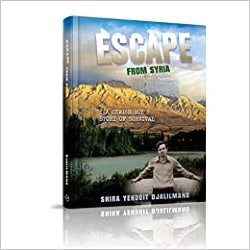This is part of a combined review for Escape from Syria and Escape from Hungary.
Escape From Syria introduces Zaki Farhi, now known as Rabbi Isaac Farhi, a prominent rabbi in New Jersey. Zaki, his friends, and his family made repeated attempts to escape from Aleppo, Syria, where the Jewish community was sizable but Jewish life was impossible. Zaki hoped to reach Israel, where he and his family would be able to live as proud, religious Jews. Zaki’s story keeps readers breathless as much as any edge-of-the-seat fiction story; nonetheless, it is based on fact. Facing a deep river with a swift current impossible to cross, hazardous border patrols who were determined to stop them, and other terrifying events, Zaki, his friends, and his family were ultimately successful in their attempts to start a new life.
Escape From Hungary takes place before and during the Hungarian Revolution of 1956. Even in the immediate post-Holocaust years, Hungary was antisemitic and unwelcoming of Jews. When the Soviets came to power, things did not improve. Young Giyuri and his family attempted to escape to Austria, then to Israel, and eventually to Canada.
The fortitude and strength needed to survive in spite of persecution are impressively described. The determination of Giyuri and his family is role-model worthy.
Escape From Belgium is based on the memoir Flight to Freedom by Renee Worch, detailing her family’s escape from Antwerp, Belgium, during Holocaust and their eventual reunion in England.
The Berkovits family became aware that life as they knew it in Antwerp would no longer be possible as the Nazis began their Belgian invasion. They hoped to escape to a country where they could bring up their children in safety. Fleeing among hordes of refugees, though, was both perilous and frightening, with no guarantee of eventual success. After a long journey to the coast, the family was accidentally split up when most of them made it onto a cargo ship bound for England, leaving oldest brother Brudi and his father still ashore.
The two continued their effort to escape to freedom with limited food, lack of shelter, and German bombers swooping overhead. At one point, they hid in a cellar, listening to the terrifying sound of the Battle of Belgium raging. Lack of travel documents, corrupt officials, and the fear of capture accompanied them constantly, but they also met with occasional kindness from unexpected quarters. Eventually they reached first France, then Spain, and, after a harrowing trip over the mountains,Portugal. Their hope was to find a haven in England where they could live in peace. Against overwhelming odds, they did eventually reach England, reunited the family, and lived in Manchester for many productive years. Their courage and fortitude is evident in the recounting of this suspenseful tale.
Each book in the series contains valuable educational appendices: a timeline of events, a glossary of terms, black-and-white photographs, and maps. Each presents a facet of Jewish history that young readers might find unfamiliar. Together these stories exemplify determination, courage, faith, and optimism.
Michal Hoschander Malen is the editor of Jewish Book Council’s young adult and children’s book reviews. A former librarian, she has lectured on topics relating to literacy, run book clubs, and loves to read aloud to her grandchildren.





